|
|
|
Sort Order |
|
|
|
Items / Page
|
|
|
|
|
|
|
| Srl | Item |
| 1 |
ID:
113519
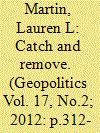

|
|
|
|
|
| Publication |
2012.
|
| Summary/Abstract |
Critical security scholars have argued that biometric identity technologies, databanking, digital surveillance, and risk analysis reveal not a blockaded boundary but a border that follows transboundary migrants as they move within and between national territories. Managed through risk-based technologies, this networked, contingent border respatialises inclusion and exclusion, forming a border that is potentially everywhere and nowhere in particular. At the same time, immigration scholars have shown how immigration authorities deploy policing, inspection, and identification practices both within and beyond territorial boundaries, making life increasingly uncertain for noncitizens. In the US, Immigration and Customs Enforcement's (ICE) authority to detain noncitizens has become a key spatial strategy in domestic counter-terrorism, interior immigration enforcement and border securitisation. Thus, transboundary migration and state responses to it trouble analytic distinctions between domestic and foreign policy, immigration and national security, the border and the interior. This paper builds on recent work in immigration geopolitics to analyse how detention, in particular, works to contain individual migrants and deter future migrants. Focusing on noncitizen family detention, this article situates US noncitizen detention in a broader milieu of pre-9/11 US immigration enforcement law and post-9/11 security practices. I then analyse how detention congeals a number of spatial strategies - remoteness, isolation, spatial ordering, inter-centre transfers, and criminalisation - that work to destabilise migrants' support networks. Modulated with digitised border and identity surveillance technologies, detention foregrounds the persistence of disciplinary tactics in risk-dominated security regimes.
|
|
|
|
|
|
|
|
|
|
|
|
|
|
|
|
| 2 |
ID:
113517
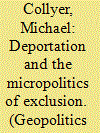

|
|
|
|
|
| Publication |
2012.
|
| Summary/Abstract |
The forced removal of foreign nationals has been a relatively uncommon occurrence in liberal democracies, at least since the 2nd World War. This can be explained by both the inherent violence of this process, which raises widespread public opposition, and by the geopolitical difficulties it raises, as there must be agreement of both countries concerned. In recent years these problems appear to have been partially overcome and since 2005 a 'deportation turn' is evident across the European Union as deportations increase. This paper focuses on the international dimension to this increase, following work investigating deportation as an essentially biopolitical process of international governance of populations. This approach is developed in an analysis of the geopolitical impacts of that management process. The paper uses empirical research with Sri Lankan migrants who left the UK either as a result of force or voluntary returns policies to explain this development. It identifies the changing strategy of the deportation process, particularly recent attention to the negotiation of bilateral and multilateral readmission agreements and the role of international organisations as mediators as key contributions to an explanation for the rise in deportations.
|
|
|
|
|
|
|
|
|
|
|
|
|
|
|
|
| 3 |
ID:
113521
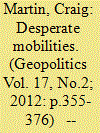

|
|
|
|
|
| Publication |
2012.
|
| Summary/Abstract |
This paper sets out to address the increasing strategic power of logistics management in the context of commodity and corporeal mobilities. In doing so it looks to the strategy of interconnectivity in order to address the management of legitimated mobilities. It is argued that the geopower of commodity mobility is premised on the infrastructural strength offered by logistics management, a form of spatial and temporal control that operates through increasingly territorialising means. However, given the infrastructural 'tension' that processes of standardisation have created, the paper also concerns the appropriation of commodity mobility networks for the purposes of illegitimated corporeal mobility. In part this is intended to develop the critiques of globalisation which challenged the image of transnational mobility networks as part of a borderless, boundless present typified most readily by the flows of information, capital and commodities. By contrast the 'desperate mobilities' of undocumented immigrants attests to the rather more tangled manifestations of mobility that many individuals have to traverse. In particular I focus on the fallibility of strategic sites within global commodity movement and the uses of 'extra-logistical knowledge'.
|
|
|
|
|
|
|
|
|
|
|
|
|
|
|
|
| 4 |
ID:
113518
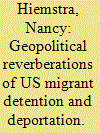

|
|
|
|
|
| Publication |
2012.
|
| Summary/Abstract |
While recent scholarship has paid critical attention to the changing relationship between territory and borders, there remains much to be said about the ways in which borders are being pushed outwards via immigration enforcement. In this paper, I argue that one must look outside the borders of the policymaking state to understand the geopolitical depth and breadth of immigration enforcement policies and practices. I examine ways in which US migrant detention and deportation reverberate in Ecuador. Research in Ecuador with detained migrants' family members and deported migrants shows that the impacts of these policies are far from contained along with the migrant's incarcerated and "removed" body; instead, they extend spatially and temporally beyond US borders, and into local, personal spaces and places in Ecuador. I demonstrate that scrutiny of the extra-border geographies of immigration enforcement policies allows us to identify the uneven, unpredictable, and sometimes violent ways in which these policies expand in practice. This research also suggests that detention and deportation do not meet US policymakers' stated objective of deterring future migration.
|
|
|
|
|
|
|
|
|
|
|
|
|
|
|
|
| 5 |
ID:
113520
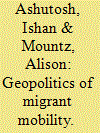

|
|
|
|
|
| Publication |
2012.
|
| Summary/Abstract |
This paper highlights how states attempt to control migrant mobilities through refugee claims. We examine the representations and practices of refugees in the refugee claimant process over time and in very different cases with distinct geopolitical influences and inflections in Canada. Our paper is based on case studies of Sri Lankan Tamil migrants in Toronto and refugee claimants from Fujian province, China, that landed in British Columbia in 1999. We analyse the ways that geopolitics influence every phase of the refugee claimant process, from the representations of claimants, to the decisions made about refugee claims, and the tenor of mundane encounters with state authorities. Our findings indicate that the geopolitics of migrant mobilities are produced through everyday state practices as well as by migrant strategies to move and resettle.
|
|
|
|
|
|
|
|
|
|
|
|
|
|
|
|
| 6 |
ID:
113516
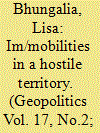

|
|
|
|
|
| Publication |
2012.
|
| Summary/Abstract |
This article examines the biopolitical dimensions of conflict manifest in Israel's disengagement from the Gaza Strip. Exploring a managed relation between life and death largely unaddressed in Foucault's conception of biopower, it contends that Israel's "disengagement" can be seen as a more sophisticated, flexible form of engagement that does not disinvest in or abandon life, but actively regulates it. Close analysis of emerging tactics of population control in Gaza illustrate that neither a "pure" politics of life or death emerges; rather, a more complex management of the two is achieved through the modulation of crucial life-sustaining and life-eliminating flows into and out of the territory. This paper links biopolitical practices of mobility regulation to the ways in which life is enabled, constrained and denied for those in a territory designated as "hostile." Thus, it directly connects the biopolitical dimensions of conflict to territory and the geopolitical violences of territoriality.
|
|
|
|
|
|
|
|
|
|
|
|
|
|
|
|
| 7 |
ID:
113523


|
|
|
|
|
| Publication |
2012.
|
| Summary/Abstract |
An argument can be made that US lawmakers' replacement of "deportations" and "exclusions" with "removals", in the mid-1990s, marked a decisive about-face in US deportation and exclusion practice by virtue of the due process restrictions that this brought about for a new class of noncitizens deemed neither deportable nor excludable. However, I argue here that the geography of due process rights under assault in the mid-1990s immigration lawmaking were never that certain in the first place. By reviewing a range of key court cases and immigration control practices from the Chinese Exclusion era through the present, I argue that US geopolitical borders have never mapped directly onto its legal-territorial borders as concerns deportation and exclusion. Nonetheless, I also point to a recent, "neo-classical" hardening of US immigration enforcement by virtue of the disconnect between geopolitical and legal-territorial borders in US immigration law.
|
|
|
|
|
|
|
|
|
|
|
|
|
|
|
|
| 8 |
ID:
113522
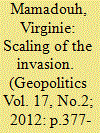

|
|
|
|
|
| Publication |
2012.
|
| Summary/Abstract |
This paper analyses narratives about immigration and immigration policies as geopolitical discourses. It focuses on the diverse geopolitical imaginations and representations of the immigrant "invasion" in Western Europe. It builds upon insights from critical geopolitics, especially Ó Tuathail's grammar of geopolitics (2002), and adapts this framework for analysing geopolitical reasoning about specific flows of people. It distinguishes three main storylines of the "invasion" at three scales: Invaded Neighbourhood, Nation at Risk, Western Europe under Siege. Although each shares the "invasion" storyline, these complementary and at times competing discourses of fear target different groups of immigrants and call for different type of policies.
|
|
|
|
|
|
|
|
|
|
|
|
|
|
|
|
|
|
|
|
|